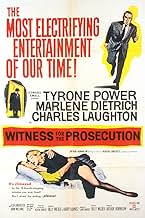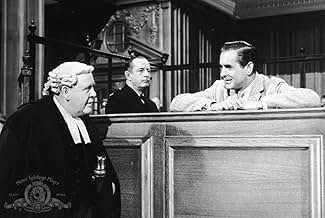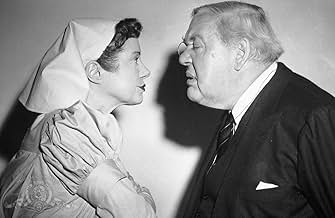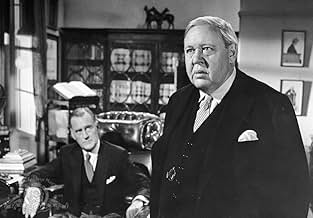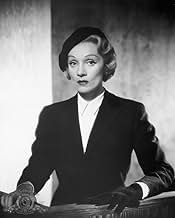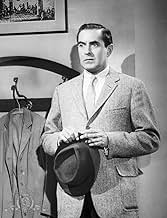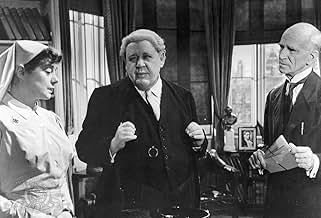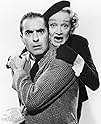Ein erfahrener britischer Rechtsanwalt muss seinen Mandanten in einem Mordprozess verteidigen, der einige Überraschungen auf Lager hat.Ein erfahrener britischer Rechtsanwalt muss seinen Mandanten in einem Mordprozess verteidigen, der einige Überraschungen auf Lager hat.Ein erfahrener britischer Rechtsanwalt muss seinen Mandanten in einem Mordprozess verteidigen, der einige Überraschungen auf Lager hat.
- Für 6 Oscars nominiert
- 3 Gewinne & 15 Nominierungen insgesamt
Patrick Aherne
- Court Officer
- (Nicht genannt)
Don Ames
- Bar Patron
- (Nicht genannt)
Larry Arnold
- Courtroom Spectator
- (Nicht genannt)
Walter Bacon
- Bar Patron
- (Nicht genannt)
Eddie Baker
- Courtroom Spectator
- (Nicht genannt)
Zusammenfassung
Reviewers say 'Witness for the Prosecution' is celebrated for its intricate plot, masterful direction by Billy Wilder, and standout performances by Charles Laughton and Marlene Dietrich. The film delves into themes of justice, deception, and complex human relationships within a gripping courtroom drama. Its twisty narrative and surprising ending are often praised for enhancing suspense and entertainment. Despite minor critiques on pacing and some performances, the overall reception is highly positive, marking it as a genre classic.
Empfohlene Bewertungen
Yours truly has never been much of a reader, though with one notable exception: the work of Agatha Christie. I absolutely, positively worship this brilliant woman and try to read as many of her novels, short stories and stage play adaptations as possible. "Witness for the Prosecution" is a genuine classic, and although somewhat atypical for Christie, it is undeniably one of the greatest stories ever penned down. There's one major disadvantage about having read all of Christie's whodunits, of course, namely that you can't experience the same astounding twist-in-the-end twice! I would really have loved to be overwhelmed by the climax of this film- version, especially because Marlene Dietrich and Tyrone Power give away such fabulous performances. The story, with its fascinating characters and dazzling plot twists, does remain the movie's biggest strongpoint, but there are a number of more reasons why "Witness for the Prosecution" is righteously considered as one of the most massive milestones in cinematic history. Billy Wilder's surefooted direction, for one, and the stellar performances of the entire ensemble cast. I mentioned Dietrich and Power already, but there's also the downright phenomenal Charles Laughton (arguably the most shamefully neglected actor/director in history) and an appealing supportive role for Elsa Lancaster. But do I daresay that the ultimate success-factor of this stage play adaptation is the masterful re-creation of the court trial? The bombastic settings and decors, the echoing acoustics, the powerful monologues of confident (and arrogant) barristers and the intimidating gowns and wigs are largely what make "Witness for the Prosecution" not only the first but also the mother of all courtroom dramas. This may just be the opinion of an avid fan, but practically ALL great courtroom-dramas that were released from the sixties until present day ("To Kill a Mockingbird", "Philadelphia", "Devil's Advocate", "A Few Good Men"
) were clearly influenced by "Witness for the Prosecution". In fact, I only have one minor complaint: *** Spoiler **** the film version adds one more final twist that I didn't find 100% plausible.
I love it when a movie captivates me, carries me along, then surprises me at the end. This is a masterpiece of human maneuvering. It has outstanding acting and a plot to die for. This is a fairly pedestrian Agatha Christie short story. I'm not saying it's not a wonderful story, just that it doesn't come to life like it does on the screen. Charles Laughton is the wonder barrister who is taking the case, even though he is in poor health. The murder case seems a relatively simple one until we begin to trip over the many layers left lying on the path. Marlene Dietrich does a masterful job in all her roles (I won't say anymore than that so I don't spoil the ending). Tyrone Power is able to balance his pathos and his potential guilt. The beauty of the movie is that it never takes itself too seriously. There are some modestly funny subplots and a great deal of careful investigation. I guarantee you that once you start watching, you won't be able to turn it off.
In a recent biography of Billy Wilder, Agatha Christie is quoted as saying that this was the best adaption of her work ever done on the screen. I can't praise Witness for the Prosecution any higher than that.
Tyrone Power in his farewell film plays Leonard Vole who befriends a dotty old widow played by Norma Varden. She even rewrites her will leaving him the bulk of a very large estate. When she's murdered, Scotland Yard arrests Power.
Power's solicitor Henry Daniell retains a dream team for defense of John Williams and the recently recovered Charles Laughton. Laughton is recovering from a heart attack and against medical advice plunges into the case. Laughton also has to deal with the efforts of his assigned nurse Elsa Lanchester to keep him following doctor's advice.
The original play this was taken from concentrated completely on the Power character and the machinations of his wife. Wilder built up the character of the nurse and barrister Sir Wilfred Robards so that they almost equaled the screen time of Mr. and Mrs. Vole. So much so that Charles Laughton was nominated for an Academy Award in 1957, but lost to Alec Guinness.
Marlene Dietrich plays Mrs. Vole. She's a war bride over from Germany and she's got her own agenda going. Her performance and what her character does is the key to the whole film. Dietrich probably would have gotten an Oscar nomination herself, but due to the fact that if her performance was hyped up for Academy consideration, the element of surprise would have been lost in the film. Wilder in fact apologized to Marlene for that.
The Anglo-Saxon legal system's goal is justice. Justice is served though not quite in the way it usually is in Witness for the Prosecution.
Tyrone Power in his farewell film plays Leonard Vole who befriends a dotty old widow played by Norma Varden. She even rewrites her will leaving him the bulk of a very large estate. When she's murdered, Scotland Yard arrests Power.
Power's solicitor Henry Daniell retains a dream team for defense of John Williams and the recently recovered Charles Laughton. Laughton is recovering from a heart attack and against medical advice plunges into the case. Laughton also has to deal with the efforts of his assigned nurse Elsa Lanchester to keep him following doctor's advice.
The original play this was taken from concentrated completely on the Power character and the machinations of his wife. Wilder built up the character of the nurse and barrister Sir Wilfred Robards so that they almost equaled the screen time of Mr. and Mrs. Vole. So much so that Charles Laughton was nominated for an Academy Award in 1957, but lost to Alec Guinness.
Marlene Dietrich plays Mrs. Vole. She's a war bride over from Germany and she's got her own agenda going. Her performance and what her character does is the key to the whole film. Dietrich probably would have gotten an Oscar nomination herself, but due to the fact that if her performance was hyped up for Academy consideration, the element of surprise would have been lost in the film. Wilder in fact apologized to Marlene for that.
The Anglo-Saxon legal system's goal is justice. Justice is served though not quite in the way it usually is in Witness for the Prosecution.
Witness for the Prosecution is one of the most entertaining courtroom stories of all time, written by the crime mistress herself, Agatha Christie. Charles Laughton completely owns the courtroom, starring as a famously brilliant barrister who's supposed to be taking a break for his health-but he gets drawn in by a truly compelling murder trial. Tyrone Power, in his last movie, has been accused of murdering a wealthy older woman. While all the evidence racks up against him, Charles doesn't give up hope and tries to win the case, all the while trying to crack the very hard nut Marlene Dietrich. Marlene is Tyrone's wife, and it's impossible to tell what she's really thinking or feeling.
I love this story, and I love both versions of the film, from 1957 and 1982. It's incredibly suspenseful and interesting-and also quite impossible to talk about without giving spoilers. If you've never seen Witness for the Prosecution, add this one to your list of classics to rent. The acting is fantastic, and the timing makes it a very entertaining old movie to watch. There are no boring bits in this drama; and I guarantee you'll still sit on the edge of your seat the second time you watch it.
I love this story, and I love both versions of the film, from 1957 and 1982. It's incredibly suspenseful and interesting-and also quite impossible to talk about without giving spoilers. If you've never seen Witness for the Prosecution, add this one to your list of classics to rent. The acting is fantastic, and the timing makes it a very entertaining old movie to watch. There are no boring bits in this drama; and I guarantee you'll still sit on the edge of your seat the second time you watch it.
Another brilliant work in the legendary career of Billy Wilder. The director signs a cinematic adaptation of this Agatha Christie story: actually it is really as if the camera went on stage for filming the play. But the film is passionating and exciting, there's no time to get bored.
Another thing we shall not forget is that Billy Wilder is European. He manages to keep the spirit of the film very British, with lots of humour and sarcasm. Compared to films like this one, "legal" movies from John Grisham's novels are empty and meaningless, without soul.
Mr.Wilder is the director, we know; we have Charles Laughton, Tyrone Power and Marlene Dietrich: what a cast! Add a superb black and white cinematography... The result is amazing, with a film where dialogues are flawless and carry everything.
Times are different now, but the atmosphere and the taste of movies like this one are impossible to find in contemporary films.
Another thing we shall not forget is that Billy Wilder is European. He manages to keep the spirit of the film very British, with lots of humour and sarcasm. Compared to films like this one, "legal" movies from John Grisham's novels are empty and meaningless, without soul.
Mr.Wilder is the director, we know; we have Charles Laughton, Tyrone Power and Marlene Dietrich: what a cast! Add a superb black and white cinematography... The result is amazing, with a film where dialogues are flawless and carry everything.
Times are different now, but the atmosphere and the taste of movies like this one are impossible to find in contemporary films.
Wusstest du schon
- WissenswertesCharles Laughton, who could be moody and difficult, was apparently a dream to work with, throwing himself into the role with dedication and delight. Billy Wilder later recalled a day that was set aside just for shooting reaction shots of the jury and courtroom crowd (composed of extras hired only for the day). Normally, the assistant director would read the actors' lines, and the extras would react. However, Laughton, who was fascinated with the whole process of filmmaking, begged to help. So he came in on his day off and read all of the off-camera speeches to the jury members. He not only read his part but also the judge's, the prosecutor's, and even Marlene Dietrich's. According to biographer Maurice Zolotow in his book "Billy Wilder in Hollywood", "it was an exhibition of craftsmanship such as Wilder had never seen. He believes that Charles Laughton had the greatest technical range and power of any actor, man or woman, whom he has known."
- Patzer(at around 9 mins) Inside his chamber, Sir Wilfrid lights his cigar, and Leonard Vole locks the door to make sure that Miss Plimsoll can't enter the room and catch him smoking. Later (at around 15 mins), Wilfrid leaves his chamber without first unlocking the door.
Actually, Vole does not lock the door, but puts the keyhole cover in place to stop Plimsoll spying through the keyhole.
- Zitate
Sir Wilfrid: I am constantly surprised that women's hats do not provoke more murders.
- Crazy CreditsAs the end credits appear on screen, an announcer's voice is heard: "The management of this theater suggests that for the greater entertainment of your friends who have not yet seen the picture you will not divulge to anyone the secret of the ending of Witness for the Prosecution."
- VerbindungenFeatured in Marlene (1984)
- SoundtracksI May Never Go Home Anymore
Music by Ralph Arthur Roberts
Lyrics by Jack Brooks
Sung by Marlene Dietrich (uncredited)
Reprised a cappella by Tyrone Power (uncredited)
Top-Auswahl
Melde dich zum Bewerten an und greife auf die Watchlist für personalisierte Empfehlungen zu.
Details
- Erscheinungsdatum
- Herkunftsland
- Sprachen
- Auch bekannt als
- Testigo de cargo
- Drehorte
- Produktionsfirma
- Weitere beteiligte Unternehmen bei IMDbPro anzeigen
Box Office
- Budget
- 3.000.000 $ (geschätzt)
- Weltweiter Bruttoertrag
- 7.903 $
- Laufzeit1 Stunde 56 Minuten
- Farbe
- Seitenverhältnis
- 1.66 : 1
Zu dieser Seite beitragen
Bearbeitung vorschlagen oder fehlenden Inhalt hinzufügen


![Trailer [OV] ansehen](https://m.media-amazon.com/images/M/MV5BNTM2MjYzMjAtZjI5MC00YTI1LWI2MzAtMWFlNDc2OTU1MTRiXkEyXkFqcGdeQXRyYW5zY29kZS13b3JrZmxvdw@@._V1_QL75_UX500_CR0)
